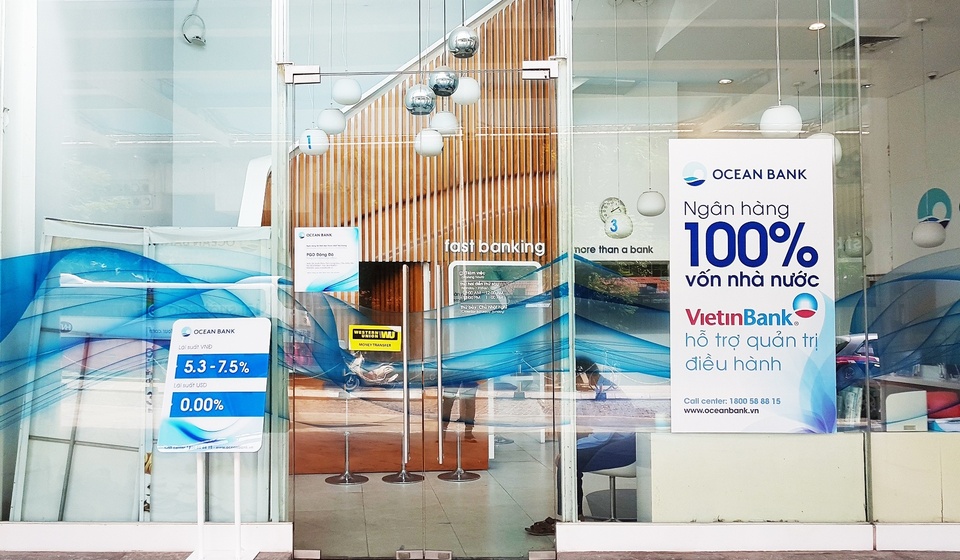Business
- Wednesday, May 3, 2023 16:17 (GMT+7)
- 22 hours ago
The State Bank has submitted and received approval from competent authorities for the compulsory transfer policy for four specially controlled banks.
 |
OceanBank is one of four weak banks that have had a solution. Photo: Quang Thang . |
In a report sent to the National Assembly's Economic Committee to review the socio-economic situation presented to the National Assembly at its 5th session, the State Bank of Vietnam (SBV) said that it had submitted and received approval from competent authorities for the policy of compulsory transfer of 4 specially controlled banks.
Of these, 3 banks are required to buy: Construction Bank (CBBank), Ocean Bank (OceanBank), Global Petroleum Bank (GP Bank) and DongA Bank (DongABank). Currently, the next contents are being carried out by the relevant parties to submit to the Government for approval of the restructuring plan of the above banks according to the prescribed procedures.
Regarding Saigon Commercial Joint Stock Bank (SCB), which will be placed under special control from October 2022, the State Bank of Vietnam said it is carrying out procedures to assess the overall situation to have a basis for developing a restructuring plan for this bank and reporting to competent authorities for approval.
The management agency said it has urgently and actively coordinated with ministries and branches to deploy solutions in accordance with legal regulations to ensure the safety of the banking system and ensure the rights and interests of depositors; regularly review and monitor to promptly handle untrue information that causes public confusion.
"Up to now, SCB's operations are still under control and gradually stabilizing; there have been no incidents of insecurity or disorder in areas where SCB branches and transaction offices are located," the report stated.
Recently, Prime Minister Pham Minh Chinh requested the State Bank to urgently direct the submission of a restructuring plan for weak credit institutions, especially SCB Bank, and noted that transparency must be ensured and no assets must be lost.
Regarding bad debt handling, according to the State Bank of Vietnam, the on-balance sheet bad debt ratio by the end of 2022 was at 2%. However, by the end of February it had increased to 2.91%, up 0.91% compared to the end of 2022 and nearly double the end of 2021 (1.49%).
Although according to banks' reports, the bad debt ratio on the balance sheet is controlled below 3%, the State Bank, through review, believes that some debts are not yet bad debts but are at risk of being transferred to debt groups, such as debts that are restructured and kept in the same group, investments in corporate bonds for the purpose of debt restructuring or bad receivables, and interest receivables that must be withdrawn.
Therefore, it is necessary to record these amounts to have management and handling solutions to prevent the risk of bad debt transfer in the future. Based on that principle, the State Bank determined that the total on-balance sheet bad debt, debt sold to the Vietnam Asset Management Company (VAMC) that has not been handled and debt potentially becoming bad debt of the credit institution system by the end of February is estimated to account for 5% of the total outstanding debt.
In 2023, the world economy is forecast to continue to fluctuate and cannot recover quickly. Many major economies still face risks such as slow GDP growth, inflation, unemployment, bad debt, etc. Zing readers are invited to read the 2023 Economic Bookshelf to grasp new economic knowledge and information in 2023.
Thanh Thuong
compulsory transfer Ho Chi Minh City OceanBank CBBank OceanBank GP Bank scb compulsory transfer special control bank
You may be interested in
Source link






![[Photo] T&T 1 and Ho Chi Minh City 1 People's Police Teams won the men's and women's team championships](https://vphoto.vietnam.vn/thumb/1200x675/vietnam/resource/IMAGE/2025/5/22/39db06ae67cb4001b7a556e8d9a56d07)






















































































![[Podcast] Week introducing more than 500 OCOP products in Hanoi](https://vphoto.vietnam.vn/thumb/402x226/vietnam/resource/IMAGE/2025/5/22/d144aac2416744718388dbae3260e7fd)

Comment (0)